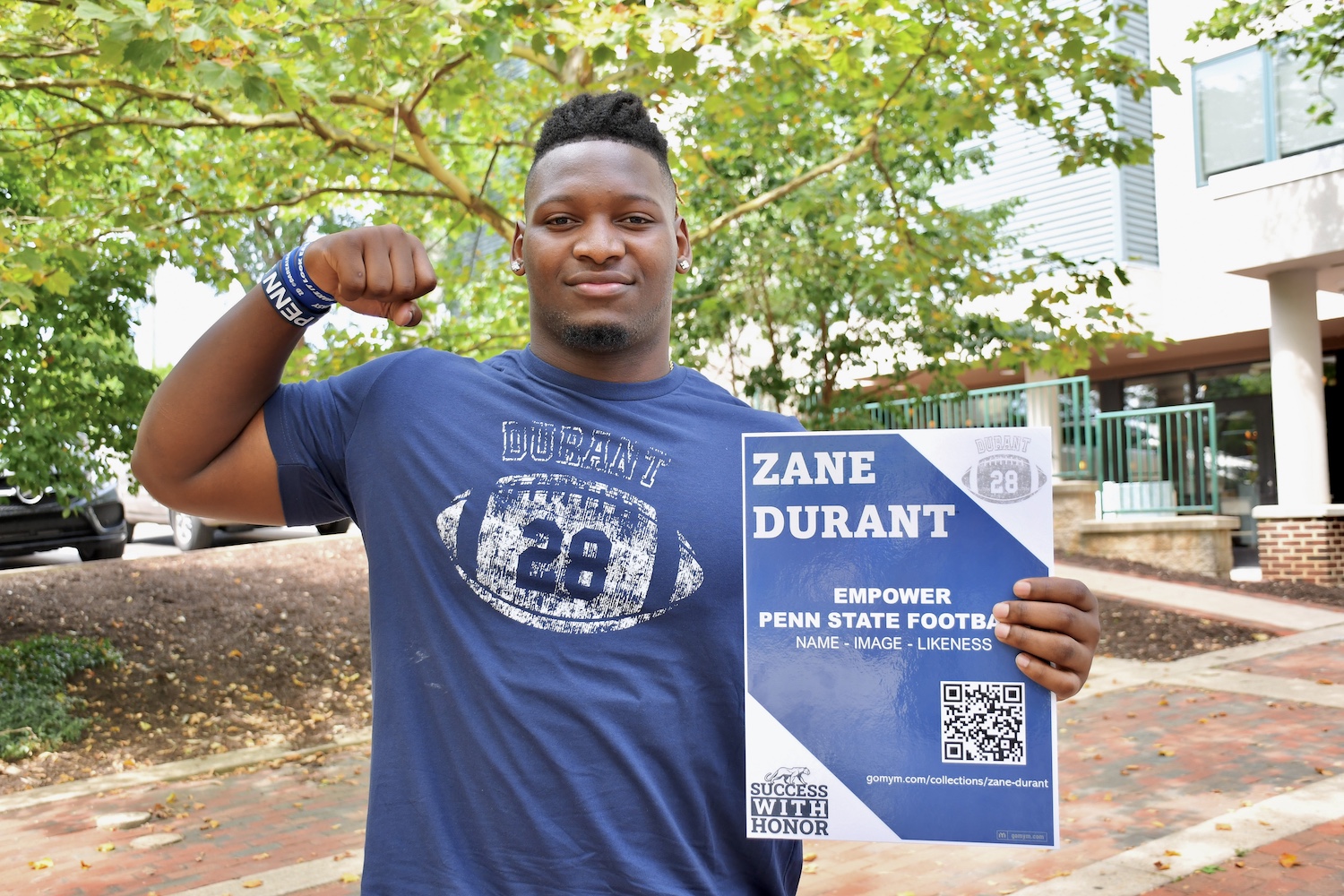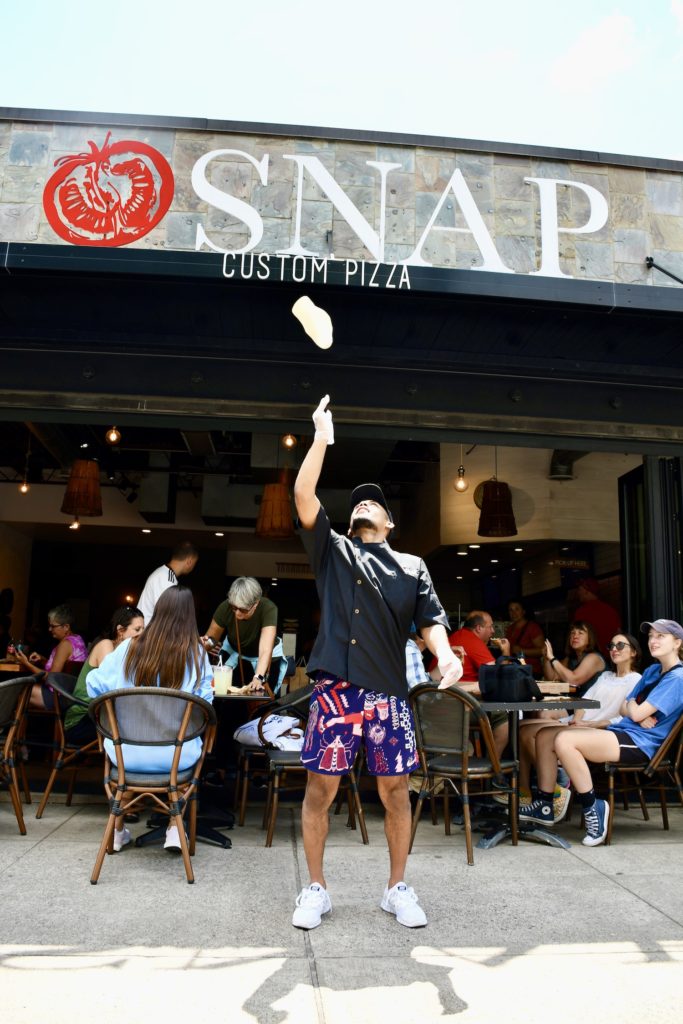
With the help of Success With Honor and custom apparel company Make Your Move, Penn State Football freshman Zane Durant wears and launches his own merchandise line using his name, image, and likeness. (Photo courtesy of Success With Honor)

With the help of Success With Honor and custom apparel company Make Your Move, Penn State Football freshman Zane Durant wears and launches his own merchandise line using his name, image, and likeness. (Photo courtesy of Success With Honor)
Mark Toniatti, a 1972 Penn State graduate, remembers the days when Nittany Lions fans and donors mailed their checks to the athletic department and mostly stayed away from athletes in fear of violating NCAA rules.
Last year, however, Toniatti and everyone else saw a tidal shift in those relationships between athletes and fans.
On June 30, 2021, shortly after the Supreme Court unanimously affirmed a lower-court decision in a case against the NCAA, college sports’ governing body’s board of directors announced it was adopting a policy that would take effect the next day.
The policy removed restrictions on college athletes from entering paid endorsements and other sponsorship deals and from using agents to manage their publicity. It essentially meant that no college athlete in any state will be ruled ineligible if he or she monetizes their name, image, and likeness, or NIL.
“We were brought up to stay away from the athletes,” Toniatti says. “That’s been ingrained at Penn State. We understand that, but we’re in a different era today. It’s different today than it was back then.
“People have to embrace the new. You may not like it. You may like it. You may have your own opinion on it. That’s not the point. If you’re going to be competitive, you have to be successful with your NIL.”
After several NIL collectives emerged last year, Toniatti and four other Penn State alumni formed Success With Honor with the blessing of the university’s athletic department. Toniatti, Ira Lubert, Rick Sokolov, Bob Poole, and Anthony Misitano each contributed at least $100,000 “to have seed money.”
Lubert is chairman of the board, and Toniatti serves as chief executive officer.
“We dedicated that none of us will ever make a dime on the collective,” Toniatti says. “We’re doing this strictly for the love of Penn State and the student-athletes. Our goal was to support Penn State Athletics and the student-athletes and help them sell their name, image, and likeness.
“We’re the preferred collective for Penn State. We’re not the exclusive collective.”
‘This year it’s everywhere’
If Penn State football coach James Franklin has sounded like he’s obsessed with NIL, the No. 1 issue in college athletics these days, it’s because he is.
NIL has become as important to Franklin in the last year as recruiting and teaching are.
“I think a year ago we felt it a little bit, but it wasn’t really a major factor,” he says. “This year it’s everywhere. You’re reading about it. You’re hearing about it. You’re dealing with it pretty much with every player on your roster. Every recruit, parent, and [high school] coach is asking about it.”
With its announcement in the summer of 2021, the NCAA surrendered after years of defending itself against lawsuits, most notably the one filed by former UCLA basketball star Ed O’Bannon in 2009 on behalf of Division I football and men’s basketball players. The lawsuit challenged the organization’s use of the images and likenesses of former athletes for commercial purposes, citing EA Sports’ NCAA Basketball and NCAA Football video games.
Franklin has been on a crusade, publicly and privately, to get Penn State administrators, donors, and fans to understand the importance of raising money through NIL deals for players. He and coaches elsewhere don’t like it, but these are the new rules of the game.
NIL opportunities are regarded as one of the chief reasons why transfers have increased in major college football in the last year. Using NIL deals as recruiting tools is prohibited by the NCAA, but athletes are transferring to schools where they are receiving more lucrative NIL deals.
For Franklin and other coaches, that means re-recruiting their own rosters to keep players happy so they don’t leave like University of Pittsburgh wide receiver Jordan Addison did for the University of Southern California.
“I don’t think there’s a whole lot of fear that the NCAA is holding people accountable,” Franklin says. “What they’re trying to do is put things back on the campus level or on the conference level and have the schools and conferences regulate themselves.
“If you’re at a school that’s pretty conservative as a university, as an athletic department, and as a compliance department, you’re in a much more challenging situation.”
Franklin believes that Penn State is behind many schools when it comes to NIL, although no one, including him, has revealed Penn State’s exact numbers. But Ohio State coach Ryan Day said in June that the Buckeyes would have to raise $13 million in NIL deals to keep their roster intact beyond next season.
Building their brands
According to Toniatti, 72 Penn State athletes in 20 of the university’s 31 sports have earned some type of income through Success With Honor, including 27 football players, since its inception earlier this year.
“We had an autograph session right after the Blue-White Game,” Toniatti says. “The night before, we had football players at Medlar Field at Lubrano Park to talk to our subscribers.”

Penn State women’s basketball coach Carolyn Kieger says almost half of her roster has earned money through Success With Honor.
“It’s phenomenal that our young men and women are able to monetize their name, image, and likeness and work to build their brands,” Kieger says. “There are so many opportunities that exist for these athletes to expand their networks and to latch onto the alumni communities.
“There’s no doubt that NIL has evolved throughout this year, what it is, how we look at it and how we treat it. It’s drastically changed the game. It’s changed college athletics. It’s changed recruiting.”
Penn State quarterback Sean Clifford says he made more than $100,000 in NIL deals last year. He made the bold move earlier this year to form his own company, Limitless NIL, the first agency founded by a student-athlete. He hopes it will guide athletes on what and when to post on social media, how to build their brand, and how to handle their finances.
Three of his first five employees are college students, including former Penn State defensive lineman Aeneas Hawkins, who retired because of injury and is the Limitless chief athlete officer, and Lions wide receiver Liam Clifford, Sean’s younger brother, who is director of development.
The company’s clients include Penn State safety Ji’Ayir Brown, Lions men’s basketball player Myles Dread and Penn State women’s basketball player Anna Camden.
Clifford says the company receives a 15-percent cut on all deals.
“I love it,” Franklin says. “To me, that’s what I hope Penn State is about. It’s about putting our student-athletes in position to take advantage of what they’ve learned in their college experience in the classroom and outside the classroom.
“Sean really understands what we are competing against because he’s talking to athletes across the country. In a lot of ways, he’s ahead of Penn State in terms of the NIL model.”
Toniatti says he doesn’t believe that Clifford’s Limitless NIL conflicts with Success With Honor.
“Sean is one of the guys who has worked with Success With Honor,” Toniatti says. “I think we have a great relationship with Sean. We support what he’s doing.”
Penn State freshman running back Nick Singleton already has signed with powerhouse firm Athletes First, which also represents, among others, Green Bay Packers quarterback Aaron Rodgers and Dallas Cowboys linebacker Micah Parsons, the former Penn State star.
Singleton already has endorsement deals with such national sponsors as Gatorade and Topps, the sports card company. He also has signed a multi-year deal with West Shore Home, a home improvement company based in Mechanicsburg.
‘It needs to be now’
Franklin says he and new Penn State director of athletics Patrick Kraft are on the same page when it comes to NIL and its impact.
“Anybody who’s been in college athletics for a long time, specifically major college football, knew where this was going as soon as this rule was passed,” Franklin says. “I know in my conversations with Pat, he has a very clear understanding of what we’re competing against when it comes to football.”
Kraft was the AD at Boston College for the last two years. He said at his introductory press conference in April that his department “put the structure in place for the athletes to maximize their brand and their opportunities.”
“Athletes should have the opportunity to monetize their name, image, and likeness,” Kraft says. “I do have an issue with people calling others on rosters and offering them money to go into the [transfer] portal. That’s what is happening. We have to find a way to fix that. That’s going to be the biggest challenge.
“It [NIL] is going to be one of the things, we’re going to have to dive into right away.”
One NIL analyst predicted in the spring that football and men’s basketball players in Power Five conferences will make at least $50,000 apiece each year.
“I don’t think it’s sustainable nationwide,” Franklin says. “But there are certain areas of the country and certain conferences where it is sustainable. People say this won’t be continued after a couple years. I disagree. They’ll do it where football is really important to the fan bases, the boosters, and the donors.”
Toniatti says Success With Honor wants to conduct business the right way, following the rules of Penn State, the commonwealth of Pennsylvania, the U.S. government, and the NCAA.
“We do not get involved with recruiting or the transfer portal,” he says. “We run it the way it should be run and that you would expect it to be run. The integrity of the guys who put this together is absolutely phenomenal. Fortunately, none of us needs to try to make money out of it.
“When someone tries to wrap their arms around all this, we want them to look at Success With Honor as the model. That’s our goal.”
Kieger endorses Success With Honor mostly because the collective wants to help all 31 Penn State sports.
“They have a deep passion for Penn State and Penn State Athletics,” she says. “They want to help grow the brand and help all our teams be as successful as possible. They understand that this space is going to be important in the future, the success of all our teams.”
According to Toniatti, only about 300 of Penn State’s estimated 850 athletes are on full scholarship.
“We believe we don’t have to match the outrageous offers,” he says. “We don’t have to be the highest-dollar amount. I think the athletes that Penn State recruits come here for multiple reasons, not just for a dollar. We have to be competitive.”
Franklin seems to have a greater sense of urgency when it comes to NIL.
“There is no long haul,” he says. “It needs to be now. It needs to be yesterday. College football has changed more in the last five years than it did in the previous 20. NIL is not long haul.
“We have to do everything we possibly can to put Penn State in the best position this season and in protecting our own roster for the future.” T&G
Rich Scarcella has covered Penn State football for the Reading Eagle since 1989.
Receive all the latest news and events right to your inbox.
403 S. Allen Street
State College, PA 16801
Phone: 814-238-5051
